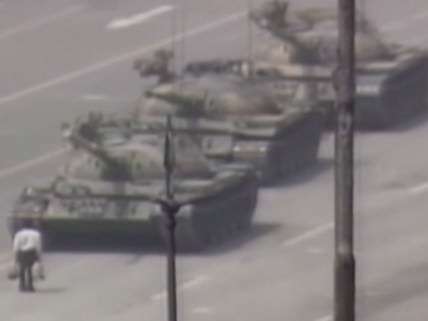On Anniversary of Tiananmen Square Massacre, Hong Kong's Occupy Protesters Fight Their Own Fight
The Umbrella Movement is focused on its own struggle, not mainland China's.
Today is the 26th anniversary of the massacre of more than 1,000 pro-democracy student-demonstrators at the hands of soldiers of the People's Republic of China in Beijing's Tiananmen Square. To this day, the Chinese government forbids any public acknowledgment of the massacre and many young Chinese are either unaware of the historical significance of June 4 or too scared to admit their knowledge.

Hong Kong is the only city in China with enough freedom of speech to allow for a public remembrance, thanks to the "one country, two systems" philosophy that grants Hong Kongers much of the social and economic freedom they were allowed during a century of British rule. But after 2014's student and Occupy-led Umbrella Movement fizzled without any concessions from the Chinese government regarding Hong Kongers' desire to directly elect their own leaders, the younger generation have decided they've had enough of the "perfunctory" vigils for the murdered protesters of 1989, and have elected to not participate in the annual vigil in Victoria Park, where 100,000 people are expected to converge.
The Wall Street Journal quotes 20 year-old student Cameron Chan:
"Every year it's the same, we sing the same songs and watch the same videos. For some people, going to the vigil is a bit like clocking in," said Mr. Chan. "Should we continue looking back on a historical event, or focus on the more urgent situation here now?"
According to a poll conducted by Chinese University, fewer Hong Kongers than ever self-identify as Chinese, a sentiment exacerbated by the current struggle for democratic self-determination.
In The Financial Times, the gap in national and generational identity is explained:
Michael Davis, a law professor at the University of Hong Kong, said that this year's commemorations in the former British colony would be more fractured than at an any time in recent history.
"Some of the younger and more radical Hongkongers want to emphasise the separation of Hong Kong from the mainland," he said. "There's more of an attitude of to heck with the mainland, they're not us and we must insist on Hong Kong's distinct identity."
Billy Fung, president of HKU's student union, which is organising its own vigil this year, said the people of Hong Kong should be striving for democracy in their own territory rather than in the whole of China.
"We don't have any obligation to establish Chinese democracy because we think Hong Kong people are only responsible for democracy in Hong Kong," he said.
The organizers of the Victoria Park vigil don't intend to give up on the youth. Also reported in the Journal:
Lee Cheuk-yan, former chairman of the Hong Kong Alliance in Support of Patriotic Democratic Movements in China, which organizes the vigil, said this year's event will try to connect the student protests of 1989 in Beijing to the Occupy protests in Hong Kong last year, which challenged Beijing on how the city should elect its leader.
"Our strategy is to link the two things, so people can see that democracy in Hong Kong and in China are part of the same resistance. Their opponent is the same," said Mr. Lee. "The two fights are the same fight".
This year, there will be a special mention of activists who have been imprisoned on the mainland for voicing their support for Hong Kong's pro-democracy protests, which lasted from September to December. Mr. Lee said about 200 people had been arrested, and over 20 still remain in prison.
Meanwhile, a group of 11 Chinese-born students studying in the US, UK, and Australia sent an open letter to the Chinese Communist Party, using software allowing the document to get past censors, demanding accountability for the 1989 massacre and an end to the reign of "fear":
"We do not ask the (Chinese Communist Party) to redress the events of that spring as killers are not the ones we turn to to clear the names of the dead, but killers must be tried," the letter reads. "We do not forget, nor forgive, until justice is done and the ongoing persecution is halted."
Naturally, the Chinese government is not impressed. In the state-run Global Times, an editorial described the letter's writers as "overseas hostile forces" and doubted it was written by Chinese-born students at all:
If the letter is truly written by a few students overseas, we have to say that those young people have been brainwashed in foreign countries, copying the paranoid minority overseas.
The editorial adds:
It's the students who participated in the Tiananmen incident who have the final say over the issue. At a time when the group, in their 50s nowadays, still play an active role in Chinese society, young students, if truly interested in what happened then, should figure out the attitude of the participants and respect their collective recognition.
A majority of those student activists 26 years ago threw themselves into China's reform and opening-up in the aftermath of the incident. As creators of China's remarkable achievements, they have shared destiny with the country and witnessed the country's profound changes over the past 26 years.
Surely, if Tank Man is (were?) still alive, he and his cohort would reflect on the "remarkable acheivement" of China's economic progress and let bygones be bygones.


Show Comments (17)